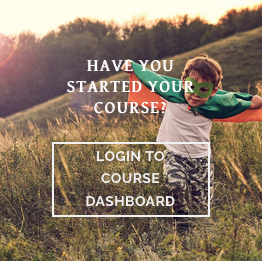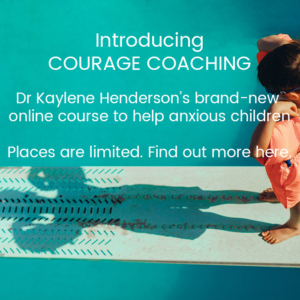5 Tips For Helping Children Conquer Their Anxiety
Written by Dr Kaylene Henderson
Many of us watch on as our little ones feel anxious at times, wishing we could magically make their anxiety disappear. Surely their lives would be easier, their days calmer and their moods happier if we could somehow rid them of anxiety?
Yet, we can’t. Because anxiety is a universal human experience.
We ALL feel anxious sometimes.
And the reality is, we’d be in a bit of trouble if we didn’t.
Anxiety is a feeling that’s been cleverly hardwired into us to keep us safe. When we sense danger, our mind sharpens to focus solely on the situation at hand and our body helpfully spurs into action. We start breathing more rapidly so that we can take in more oxygen. Our heart beats more quickly so that it can deliver this oxygen to our muscles, readying us to flee or to engage in battle. Our incredible bodies work in this way to ensure our survival. And we wouldn’t want it any other way.
So if anxiety is so helpful, why is it considered a problem? And why do so many people struggle with it, including our children?
There’s a helpful analogy that’s often used, that likens anxiety to a smoke alarm.
You see, when there’s a fire present, a smoke alarm sounds and we fly into action, ready to battle the blaze or to escape; But for many children, this alarm can become a little too sensitive. It can start to sound when it needn’t. When this happens, our little ones will feel anxious in situations in which there’s nothing to fear.
Because they incorrectly sense danger, our children may start to avoid activities that they should otherwise be enjoying – like heading to kindy, joining in at play dates or sharing stories with their classmates during show and tell. They can also spend a lot of time worrying, asking a seemingly never-ending stream of questions that begin with the words, ‘But what if…’. Understandably, being bombarded by repeated false alarms tends to be stressful and exhausting (and not just for our kids…).
Over time, a troubling shift can occur. Rather than feeling in control of their anxiety, our children can start to feel like their anxiety is in control of them. And let’s face it, it’s impossible for them to feel confident or brave when they’re not in control.
The good news is, there is SO much we can do to help our children learn about anxiety and how to regain control of it.
Based on my decades spent as a doctor, Child Psychiatrist and Mum, here are 5 tips to get you started.
5 top tips to help your children overcome their anxiety:
1. Teach your kids that anxiety is a normal and often helpful feeling. Sure, it might get a bit carried away sometimes, but anxiety itself is completely safe. They needn’t feel anxious about…well… feeling anxious
2. Normalise anxiety – tell stories of times that you’ve felt anxious and of how brave you’ve felt when you’ve faced your fears
3. Picture books are wonderful tools for teaching children about anxiety. They teach children that they’re not alone in their experience and can provide both practical guidance and reassurance in a non-threatening way. Your local library will often be a great place to start your search
4. Encourage your children to slow their breathing down when they’re feeling anxious. It sounds so simple, yet this one simple trick quickly switches off any false alarms and helps us to feel better. After all, this isn’t how you’d behave if there was truly danger about. In fact, nothing sends the message “I’m safe thanks anxiety – no need for me to fight or flee – you can head off now”, quite like staying put, slowing your breath down and sticking with whatever task you first set out to do
5. Teach your children that, just like the rest of their body, they’re in charge of their thoughts and that these thoughts, in turn, influence how they feel. In order to feel better, our children can learn to tell themselves a helpful, accurate message. Better yet, the two of you can come up with a few of these helpful alternative thoughts ahead of time. Chances are, if your kids are prone to frequent anxiety, they’ve fallen into a habit of assuming the worst is about to happen. Thankfully habits like these, while always breakable, are even easier to break when children are young and have a caring adult like you on their team, cheering them along as they master these helpful new skills
As your children learn more about anxiety and how to manage it, they will steadily gain a sense of mastery and control.
And that’s when the magic happens.
To truly make our children’s lives easier, their days calmer and their moods happier, we shouldn’t aim to somehow make their anxiety disappear. That wouldn’t be safe or even possible. Instead, we need to help them understand and control their anxiety.
And you are perfectly placed to help them do just that.
*If you’d like to learn more about this topic, I’d love to share my Courage Coaching course with you. It’s a 6 week course for parents of 4-12 year old children, in which I teach you everything I know – you’ll quickly become your child’s courage coach and guide them towards greater confidence, calmness and courage. Honestly, you can do this.
There’s no-one better placed to help your child than you (but let’s face it; sometimes it’s nice to have a friendly Child Psychiatrist by your side (aka me) – what a team we’ll be!).
Here’s the link to find out more: www.couragecoachingonline.com



